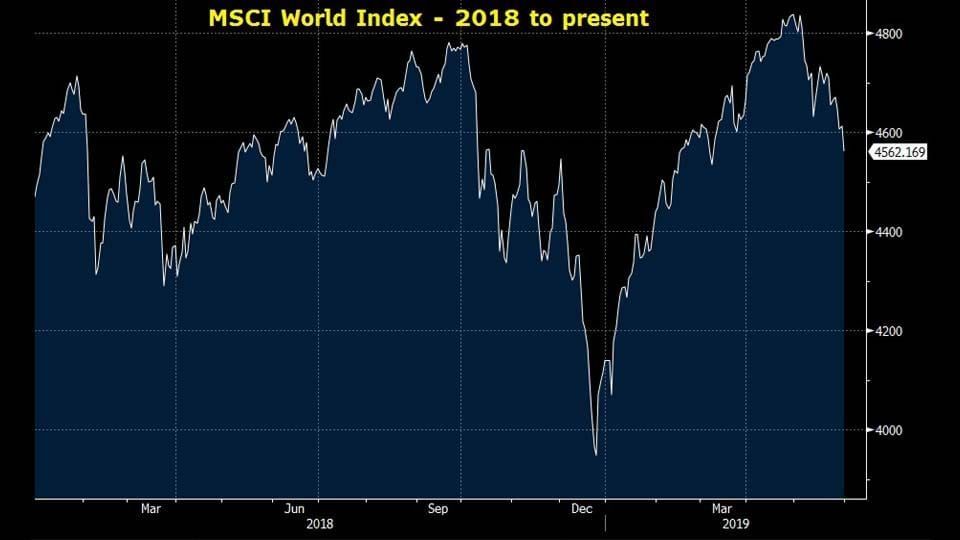After a strong start to 2019, financial markets faltered in May as trade tensions continued to weigh on investors’ minds. Last Friday Donald Trump announced there would be tariffs imposed on all goods from Mexico, and these would gradually increase ‘until the illegal immigration problem is remedied’. The news resulted in markets ending what had already been a dismal month with a further setback. During the month, the MSCI World Total Return index, which measures developed equity markets, slumped -5.7%.
However it has still been a positive year so far, with the index up +10.2% since the start of January. And as the below chart shows, the current downturn is a mere hiccup compared to the volatility experienced by markets towards the end of last year:

Source: Bloomberg. Index shows total return (i.e. includes dividends). Past performance is not a guide to future returns.
Meanwhile Prime Minister Theresa May has announced she will be resigning on 7th June, bringing her near three year tenure at Number 10 to an end. Her announcement came just two days before the results of the EU elections were unveiled. The Brexit Party led by Nigel Farage won 29 seats and 31.6% of the UK vote, while the Liberal Democrats took 16 seats with 20.3% of the vote. The Labour Party had to settle for 10 seats, while the Conservative Party put in their worst performance in an election since the 1830s and took just 4 seats with 9.1% of the vote. At the time of writing, 12 candidates have put themselves forward for the Prime Minister role, and Boris Johnson is currently the favourite with the bookmakers.
A full round-up of May market performance
In the UK, the FTSE 100 index fell -2.87%, while medium and smaller companies, measured by the FTSE 250 ex IT index and the FTSE Small Cap ex IT index, declined -4.34% and -1.21% respectively. In the US, the S&P 500 index dropped -6.35%, while in Europe the Eurostoxx 50 index lost -5.11%. Japanese stocks measured by the Topix index slid -6.52%.
Emerging market returns were also mostly negative. The MSCI Emerging Markets index fell -6.57%. Chinese equities measured by the MSCI China index tumbled -13.02% and Latin American equities, measured by the MSCI Latin America index, slipped -1.45%. However Indian stocks measured by the IISL Nifty 50 PR index managed to climb +1.49%.
In the fixed income market, UK government bonds, measured by the FTSE Gilts All Stocks index, rose +2.71% and long dated (over 15 years to maturity) gilts surged +4.46%. European corporate bonds, measured by the Markit iBoxx Euro Corporates index, returned -0.14% while sterling denominated corporate bonds, measured by the Markit iBoxx Sterling Corporates index, gained +0.63%. In the high yield market, the Bank of America Merrill Lynch Euro High Yield index and the Bank of America Merrill Lynch Sterling High Yield index shrank -1.50% and -0.54% respectively.
Commodities had a mixed month. The S&P GSCI index, which consists of a basket of commodities including oil, metals and agricultural items, was down -8.21%. Oil’s impressive run this year came to an abrupt end as the price of a crude oil futures contract plummeted -16.29%. The precious metals had mixed fortunes as the S&P GSCI Gold and Silver indices returned +1.71% and -2.58% respectively. The agricultural markets have been flying, with corn and wheat soaring +17.79% and +17.32% respectively.
In the currency markets, it was a disappointing month for the pound, as it depreciated -3.09% against the US dollar and -2.69% against the euro.













